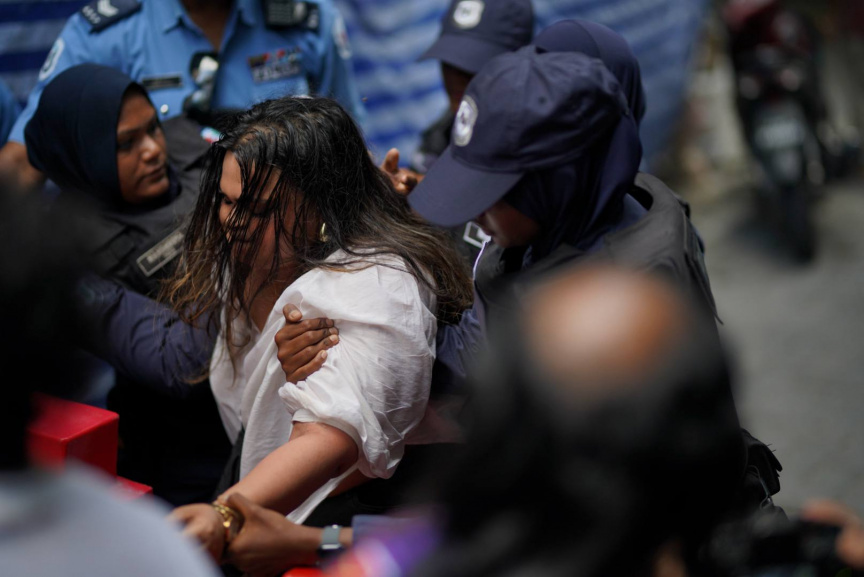
Journalists sustain injuries as they are dragged away by police from a sit-in protest outside the Parliament Building ahead of a vote on a contentious media bill on September 16, 2025. (Sun Photo/Ahmed Firyal)
The ruling People’s National Congress (PNC) on Tuesday used its supermajority in the Parliament to pass a contentious media bill that seeks to replace the existing self-regulatory system with a government-controlled commission, as demonstrations broke out both inside and outside the Parliament Building.
On August 18, Thulhaadhoo MP Abdul Hannan Aboobakr, an independent lawmaker aligned with the government, submitted a bill that seeks to dissolve the Maldives Media Council (MMC) and the BroadCom, replacing them with a single regulatory body — a seven-member Maldives Media and Broadcasting Commission (MMBC).
The bill, widely panned both local and international journalism groups, is openly backed by the PNC administration. The Parliament went into recess on August 19, but has been holding extraordinary sittings and committee meetings to work on the bill.

Despite the widespread concerns over the legislature’s implications on press freedom and freedom of expression, the Independent Institutions Committee passed the bill with multiple government-drafted amendments on Monday late afternoon, as journalists and opposition lawmakers broke out in protest.
Meanwhile, a petition signed by 151 journalists from 41 different media outlets demanding the withdrawal of the bill was rejected by the Petitions Committee on Tuesday afternoon, after the committee voted 7-5 that the concerns raised in the petition had been properly addressed.
The bill passed the floor vote during an extraordinary sitting of the Parliament held on Tuesday evening.

South Galolhu MP Meekail Ahmed Meekail, a lawmaker from the main opposition Maldivian Democratic Party (MDP), had proposed two amendments to the bill. However, both amendments were rejected as he was among several opposition lawmakers who were forcibly removed from the chambers ahead of the vote for protesting against the bill.
Meanwhile, four amendments proposed by Fonadhoo MP Mohamed Mamdhooh, a lawmaker from PNC, passed by unanimous consensus.
The bill, along with the amendments made during the committee stage and the four amendments proposed by Mamdhooh, passed with a majority vote of 60-1. The sole dissenting vote came from Velidhoo MP Mohamed Abbas, a member of the Maldives Development Alliance (MDA), who had sponsored MJA’s petition against the bill.

Journalists had begun gathering outside the Parliament Building since 08:30 am, in a final stand against the passage of the bill. They were later joined by members from the main opposition Maldivian Democratic Party (MDP), as well as other members of the general public. There was also a parallel demonstration by pro-government protesters outside the Parliament Building.
There were several incidents of confrontations, as riot police pushed back protestors, some of whom were violently dragged away, resulting in injuries.

While journalist protest against the bill as a direct threat to press freedom and a crackdown on dissent, the PNC administration touts the legislature as one that protests people from defamation.
Key amendments to the bill:

Journalists continue to express concern over the sweeping legislature, urging President Dr. Mohamed Muizzu against ratifying the bill.
Some parliamentarians have disclosed some of the amendments made to the bill, the Parliament has not shared the final bill that was passed on Tuesday on its website, making the final version of the contentious legislature unclear.

The Independent Institutions Committee, which had convened for a meeting at 02:30 pm, had passed the report on its review of the bill, without allowing members time to read through the recommendations by the Parliament’s Counsel General Fathimath Filza that the report includes.
Meekail, the sole opposition lawmaker who sits in the PNC-controlled committee, plead for time to read through the recommendations, warning that passing it without a proper review constitutes to violation of due process and casts doubt over the integrity of the report.

The committee passed the report despite his protests.
Key concerns raised by journalists:

Journalists have expressed concern over additional ambiguous phrases used in the bill that they warn are open to manipulation.